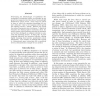AAAI
1996
13 years 5 months ago
1996
One of the most widespread approaches to reactive planning is Schoppers' universal plans. We propose a stricter definition of universal plans which guarantees a weak notion o...
AAAI
1996
13 years 5 months ago
1996
Real world images often contain similar objects but with different rotations, noise, or other visual alterations. Vision systems should be able to recognize objects regardless of ...
AAAI
1996
13 years 5 months ago
1996
In this paper we describe the design and implementation of the derivation replay framework, dersnlp+ebl (Derivational snlp+ebl), which is based within a partial order planner. der...
AAAI
1996
13 years 5 months ago
1996
Many applications of knowledge discovery require the knowledge to be consistent with data. Examples include discovering rules for query optimization, database integration, decisio...
AAAI
1996
13 years 5 months ago
1996
AAAI
1996
13 years 5 months ago
1996
Overcoming the disadvantages of equidistant discretization of continuous actions, we introduce an approach that separates time into slices of varying length bordered by certain ev...
AAAI
1996
13 years 5 months ago
1996
Anytime algorithms offer a tradeoff between solution quality and computation time that has proved useful in applying artificial intelligence techniques to time-critical problems. ...
AAAI
1996
13 years 5 months ago
1996
Cox's well-known theorem justifying the use of probability is shown not to hold in nite domains. The counterexample also suggests that Cox's assumptions are insu cient t...
AAAI
1996
13 years 5 months ago
1996
Wepresent our approach to agent modelingfor communication, and compareit to an approach to agent modelingfor other types of action. The comparisonshould be instructive since both ...
AAAI
1996
13 years 5 months ago
1996
This article advocates a new model for inductive learning. Called sequential induction, it helps bridge classical fixed-sample learning techniques (which are efficient but difficu...

